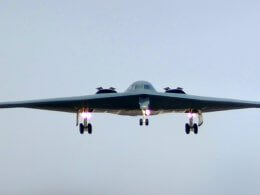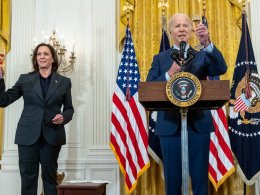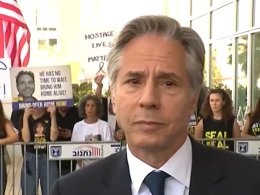A former UN nuclear inspector said that while he believes Iran’s nuclear breakout time is now zero and Tehran has enough highly enriched uranium to build a weapon, it is not clear how long it would take the Islamic Republic to assemble a bomb.
David Albright, who worked as an inspector for the International Atomic Energy Agency (IAEA) in the 1990s, made the comments in an interview published Wednesday with London-based Iran International, an Iranian opposition news outlet.
“Iran has reached this critical period where its breakout time is zero. And what that means is that now it has enough highly enriched uranium to fashion a nuclear weapon,” said Albright, the president of the Institute for Science and International Security, a private organization based in Washington that tracks the spread of nuclear weapons.
Both American and Israeli officials have assessed that Iran now needs only a few weeks to amass enough fissile material for a bomb, should it choose to make one, though it will need additional time to assemble the device’s other components.
Albright clarified that although he believes Iran’s breakout time is zero, it remains unclear how long it would take the Islamic Republic to build a nuclear weapon.
“It may not be as long as some have argued. We don’t know how quickly Iran could make nuclear weapons today,” he said.
Albright told the Iranian opposition outlet that the timing would depend on what kind of weapon Iran could decide to build.
“They may choose to make a crude nuclear explosive to detonate underground, or to deliver it crudely or through crude methods like truck or ship. That could happen over the course of several months, less than six months,” Albright said.
“They may want, on the other hand, to focus on just building a warhead for a ballistic missile; that could take longer, a year or two. So again, the critical thing is that they have reached the zero-breakout time,” he said.
The breakout period refers to the amount of time it will take Iran to amass enough fissile material for a nuclear weapon, if it chooses to do so.
Having enough nuclear material for a bomb is not the same as having the capabilities to build the core of the weapon and to attach it to the warhead of a missile, which would likely take more time.
Officials in the current US administration, led by President Joe Biden, blame the drop in Iran’s breakout time on former president Donald Trump’s decision to unilaterally withdraw from the JCPOA agreement in 2018.
The agreement gave Iran relief from crippling economic sanctions in exchange for curbs on its nuclear activities designed to prevent it from developing an atomic bomb — an ambition it has always denied. But after withdrawing, Washington reimposed biting sanctions on Tehran, prompting Iran to begin rolling back on its own commitments.
Albright said that Iran had reached this “major milestone” due to the collapse of its pact with major world powers, known as the Joint Comprehensive Plan of Action.
He said he believed that a program of intense pressure on Iran would be the only way to prevent it building nuclear weapons, and that more support was needed for Israel and other allied countries in the Middle East so that they could “push harder against Iran.”
In a report published Monday, the IAEA estimated that Iran’s stockpile of enriched uranium had grown to more than 18 times the limit agreed on in the troubled 2015 JCPOA.
It “estimated that, as of May 15, 2022, Iran’s total enriched stockpile was 3,809.3 kilograms.”
The limit in the JCPOA was set at 300 kilograms (660 pounds) of a specific compound, the equivalent of 202.8 kilograms of uranium. The report also said that Iran was continuing its enrichment of uranium to levels higher than the 3.67 percent limit in the deal.
The stockpile of uranium enriched up to 20% is now estimated to be 238.4 kilograms, up 56.3 kilograms since the last report in March, while the amount enriched to 60% stands at 43.1 kilograms, an increase of 9.9 kilograms.
Enrichment levels of around 90% are required for use in a nuclear weapon.
Earlier in May, the IAEA announced that it was “extremely concerned” by Iranian silence on potential undeclared nuclear sites.
Iran has always insisted that its nuclear program is peaceful. Israel views a nuclear-threshold Iran as an unacceptable threat, as Tehran is avowedly committed to the destruction of the Jewish state.
On Tuesday, Prime Minister Naftali Bennett published documents he said were taken from Iran and show that Iranian intelligence spied on the UN’s atomic agency in order to better cover up its rogue nuclear activities.
Revelations about the Iranian spying on the IAEA were published last week by the Wall Street Journal, based on documents from the archive Israel took from Tehran. The Journal said it received access to the documents “from a Middle East intelligence agency that hails from a country that opposes Iran’s nuclear program.” Previously only US intelligence had been provided the entire archive material, with partial access also granted to independent experts.
“Iran lied to the world, Iran is lying to the world again right now, and the world must make sure that Iran doesn’t get away scot-free,” Bennett warned.










